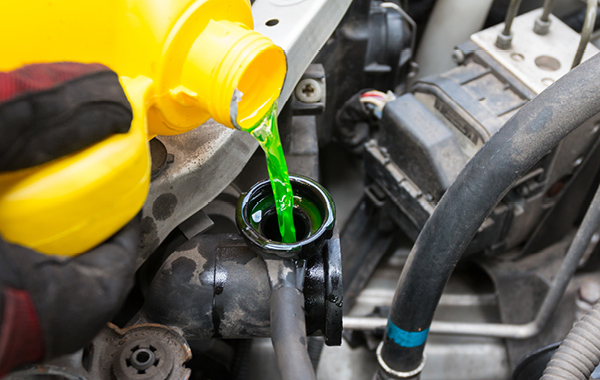Maintenance is one of the keys to extending the life of an automobile and preventing costly repairs. Vehicles serviced regularly are less likely to experience problems. When it comes to auto maintenance, paying attention to a car’s coolant is very important.
What Is Coolant?
Coolant, aka antifreeze, is a liquid that consists of water and propylene or ethylene glycol. When choosing antifreeze for your vehicle, you should always consult your owner’s manual. You want to make sure that you use the right formula for your make/model. Antifreeze is designed to help keep your engine and other components at the right temperature. If you have a leak or the fluid level is too low, your automobile will overheat.
Understanding How Coolant Maintains Engine Temperature
The way that antifreeze works is by absorbing the heat produced by the engine while a vehicle is in operation. Some people make the mistake of adding plain water to the antifreeze reservoir. This is a bad move because water can’t absorb heat– it will just begin to boil. When performing maintenance on your vehicle, and checking the fluids, never add plain water.
How Often to Change Coolant
There is no one size fits all answer for how often antifreeze should be changed. The recommended schedule varies from one car manufacturer to another. Different models from the same manufacturer may have different requirements. Your best bet is to refer to the maintenance schedule in your owner’s manual.
The age of an automobile also makes a difference. Newer vehicles can typically go longer between antifreeze changes than older ones. If you use your vehicle for towing on a regular basis, you will need to change the antifreeze more often.
Reasons to Have Your Coolant Changed
Comprehensive Inspection– A full service typically involves much more than just adding coolant to a vehicle. The old fluid will be flushed, and the entire cooling system will be inspected. This will identify any issues that may need to be fixed.
Remove Harmful Deposits– Over time, rust and scale deposits can build up in antifreeze fluid as it ages. These deposits can cause damage to the engine and other components of the cooling system. Flushing the old fluid and replacing it with fresh fluid removes the deposits.
Avoid Acidic Antifreeze– The chemical makeup of antifreeze changes as it ages and eventually becomes acidic. When this happens, the fluid can begin damaging rubber hoses, bearings, and aluminum components. It is important to change the coolant in your vehicle before it becomes acidic.
Prevent Water Pump Problems– Fresh antifreeze contains various additives that keep the water pump properly lubricated. Lubrication will help the water pump last longer before it needs a replacement.
Conclusion
Having the antifreeze in your vehicle changed is a maintenance task that you need to stay on top of. Doing so will prevent the buildup of damaging deposits and also keep your vehicle running without the engine overheating. An antifreeze change is much more affordable than dealing with an engine repair.
Don’t put your engine and cooling system at risk– stop by a JiffyLube® branch near you to have your fluid level checked, and the cooling system inspected for leaks. If your antifreeze is oil, we can flush it out and add fresh coolant.






